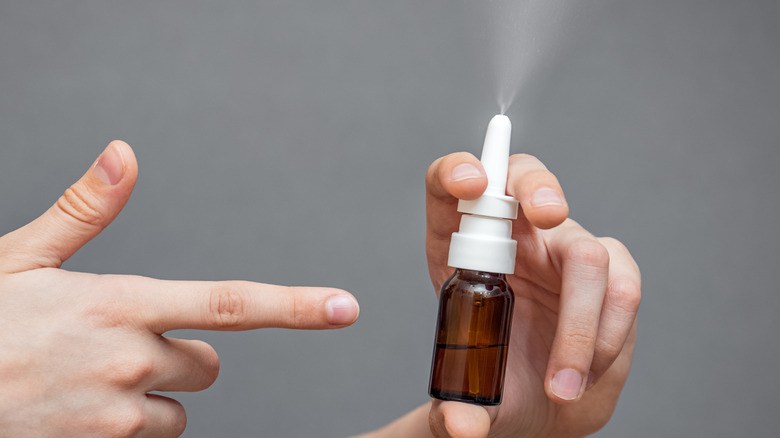What Does It Feel Like When You Have An Allergy Headache?
If you've had a severe headache or migraine in the past three months, you're not alone. According to the Centers for Disease Control and Prevention, one in four people aged 18-44 reported having an intense headache or migraine, with women being twice as likely to have one.
Stress might bring on a tension headache, which can extend down your neck and shoulders. A migraine's intense pain might accompany nausea or vomiting, or it can make light or sound unbearable. Many migraines are often confused with a sinus or allergy headache (via Healthline).
According to the American College of Allergy, Asthma, & Immunology, allergies can bring on a migraine or a sinus headache. If you have an allergy-related sinus headache, you'll feel pain in the sinus cavities of the nose, forehead, cheekbones, or eyes.
This happens because whatever triggered your allergy headache caused your sinus cavities to swell. The pressure you feel in these blocked sinus cavities results in pain. An allergy headache will make these areas painful to the touch, and you might even feel pain in your jaw, teeth, or the top of your head. An allergy headache might feel more intense in the morning but wane after you sit or stand up.
How to treat and prevent an allergy headache
If you have an allergy headache, the American College of Allergy, Asthma, & Immunology suggests taking a pain reliever to reduce the pain. There are other tricks you can try to reduce your headache. You can also put a warm, wet washcloth over your sinus areas and drink fluids to make the mucus thinner. A saline spray or neti pot can help flush your sinuses.
However, you may also need to treat the allergy with an antihistamine, decongestant, or corticosteroid. Consult an allergist and they will help determine which treatments are best for you. Alternatively, they may rule out allergies being the cause of your headaches, in which case, your headaches might be due to stress, dehydration, grinding your teeth at night, or a variety of other issues.
To prevent allergy headaches, the American College of Allergy, Asthma & Immunology suggests avoiding specific environments that typically trigger your allergies. For example, if you know that mold triggers your allergies, find ways to reduce the humidity inside your home (per WebMD). Keep in mind that fans can stir up dust. Wearing sunglasses can also protect your eyes from allergens.
The National Headache Foundation suggests seeing your doctor if your headache is extreme, or if you also experience unresolved vision loss, uncontrollable vomiting, or a loss of consciousness. You should also see a doctor if you experience abnormal and frightening symptoms, or if your headache persists for more than 72 hours.


